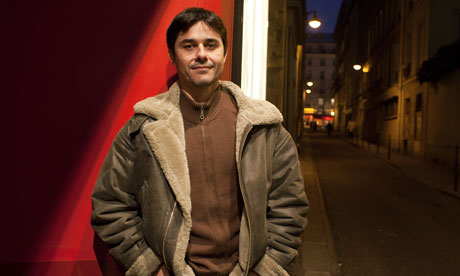
A thrilling and formally daring novel about the plan to assassinate the high-ranking Nazi Reinhard Heydrich in Prague during the second world war, Laurent Binet's HHhH was a literary sensation when it was published in France in 2010, winning the coveted Prix Goncourt. Now translated into English, it's already attracting praise from the likes of Martin Amis and Mario Vargas Llosa.
I first heard of your book when Bret Easton Ellis called it a masterpiece on Twitter. You must have been pleased.
That was crazy. He's my favourite living writer so I was very proud. It was a wonderful reward for my work, even more than the prize. American and English writers interest me more than the French ones actually.
The author's struggle to write the novel is foregrounded in the text. But I could never be certain that Laurent Binet in the book was identical to you…
He is absolutely identical. When I was a student I was always annoyed by the teachers telling me you have to make the distinction between the author and the narrator.
So in the book, when you say you were inspired to write about the Prague plot after hearing about it as a child from your father…
... that really was the inspiration. I wanted to tell the true story, including my own story. To write a novel with just one level, without a metafictional dimension, wouldn't interest me very much.
You set out to write about the two heroic men, a Czech and a Slovak, who plot to kill Heydrich, but the central character is really Heydrich himself.
I can't deny this. It was not my purpose. The idea was to focus on the operation – my original title, before my editor persuaded me to change it, was "Operation Anthropoid". But I had so much information on Heydrich and he was such a fascinating character that he became the centre. At all the turning points – all the key steps of the Third Reich – he's there.
Particularly the planning of the Holocaust. It would be easy to think of Heydrich as purely evil.
That's true. At the same time I tried to be careful with that because he's a historical character, so when you start to speak about pure evil it becomes very abstract and very unreal. That's the reason why I was not a huge fan of The Kindly Ones [the Goncourt-winning 2006 novel by Jonathan Littel which looked at the Holocaust through the eyes of a former SS officer]. It was not a bad idea what he wanted to do – mixing Greek mythology and second world war – but then I think you lose too much of the historical part. It's very precise and well documented but at the end, the character in my opinion has nothing to do with a Nazi. He's just not realistic, which is a problem for such a book.
What are your reservations about French writers?
Most of them are too lazy to search for new forms. Michel Houellebecq, for example, is seen as a very subversive writer, but being subversive depends as much on the form as what you speak about. Most French novelists are very classical, very close to the Balzac mode. The last book of Houellebecq was applauded because he had the clever idea to appear in his book as a character who is then murdered. But Easton Ellis did it in much better seven years ago with Lunar Park. They feel very subversive because they speak about sexual crimes and things like that, but Hollywood does it every day, so what's new about it?
How do you stand on the French elections?
Actually, my next book will be about the campaign. I'm following François Hollande, who hopefully will be the winner. Five years of Sarkozy have been very damaging for many people. I can't say personally I suffered as a result of it, but in a way I did. For 10 years, while writing HHhH, I was teaching in high schools in the suburbs of Paris. It was a tough job. Sarkozy didn't help because he was just cutting back on teachers. Hollande is promising that there will be more teachers – this is reason enough to vote for him.But there are many other reasons not to vote for Sarkozy – that obsession with poor people and foreigners. It's really disgusting
After the campaign book, do you have another project in mind?
Yes. I've started writing it already. I don't know what the result will be but I can tell you it's very ambitious. All I can say is that it will be a kind of semiotic detective book. When I say that, people usually stop asking questions.

